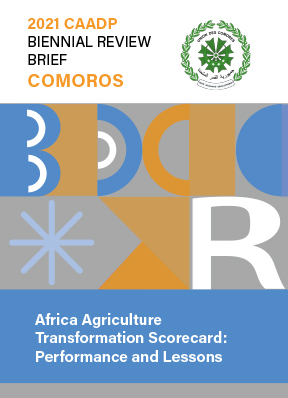Africa Agriculture Transformation Scorecard: performance and lessons. Comoros
Abstract
The Malabo Declaration on accelerated agricultural growth and transformation for shared prosperity and improved livelihoods is a set of goals that were adopted by Heads of State and Government of the African Union in 2014 in Malabo, Equatorial Guinea (AUC 2014). To translate the seven Malabo commitments into results, a call for action was made by the Heads of State and Governments, by calling upon the AU Commission and the NEPAD Planning and Coordinating Agency, in collaboration with partners, to initiate a review process to be conducted on a biennial basis starting 2017, with an objective of tracking, measuring, and reporting progress towards achieving the Malabo Declaration commitments by 2025.
Three Biennial Reviews (BR) have been conducted—the inaugural BR in 2017, the second BR in 2019, and the third and most recent BR in 2021. This brief draws on the third BR report to summarize the performance of Comoros in pursuit of the seven Malabo Declaration commitments, assesses the challenges faced and the lessons learned by the country, and highlights policy actions and programmatic measures Comoros must take in order to meet its Malabo Declaration commitments by 2025.
Overall, the third BR report shows that Comoros is not on track to achieve the Malabo commitments by 2025. The country still has quite a long way to go regarding putting in place policies to attract its youth into agricultural value chains and increasing spending for agriculture research and development as a share of GDP. Comoros needs to implement many of the recommendations emanating from the third BR to ensure progress across all seven Malabo commitments so they can be met by 2025.
Another key recommendation from the analysis is for the country to increase total agricultural research spending as a share of agricultural GDP. Efforts to increase the adoption of improved technologies, both in the livestock and crops sectors, are needed for increased agricultural productivity and greater food availability to contribute to improved food security.

